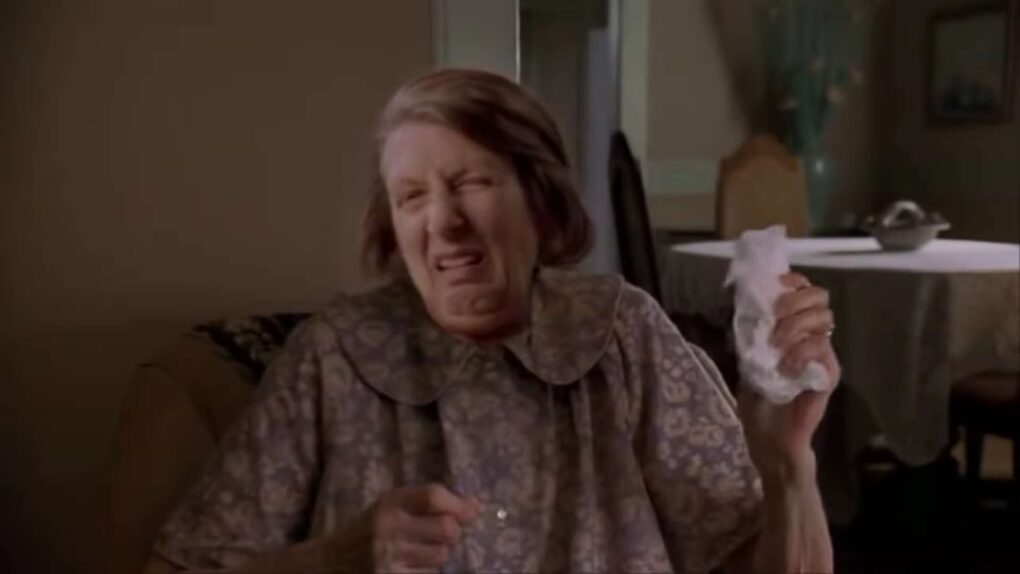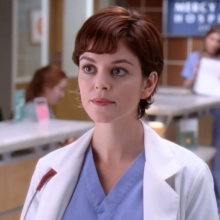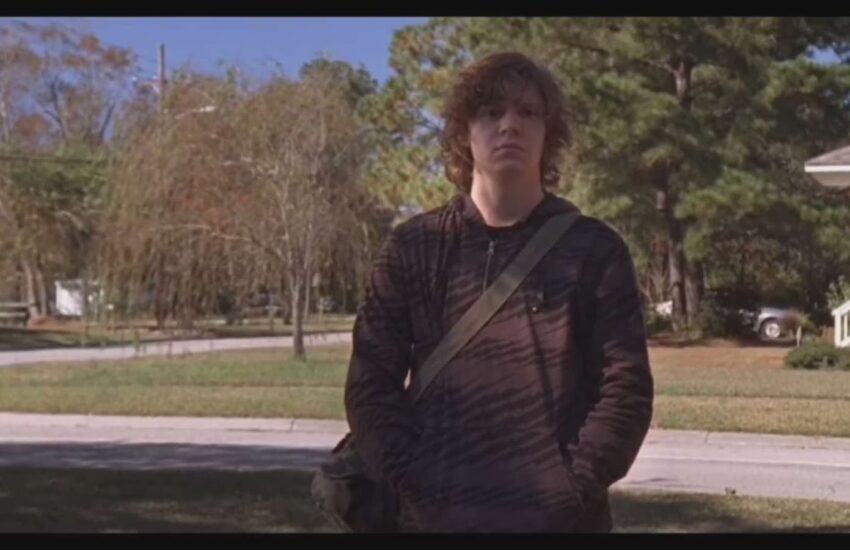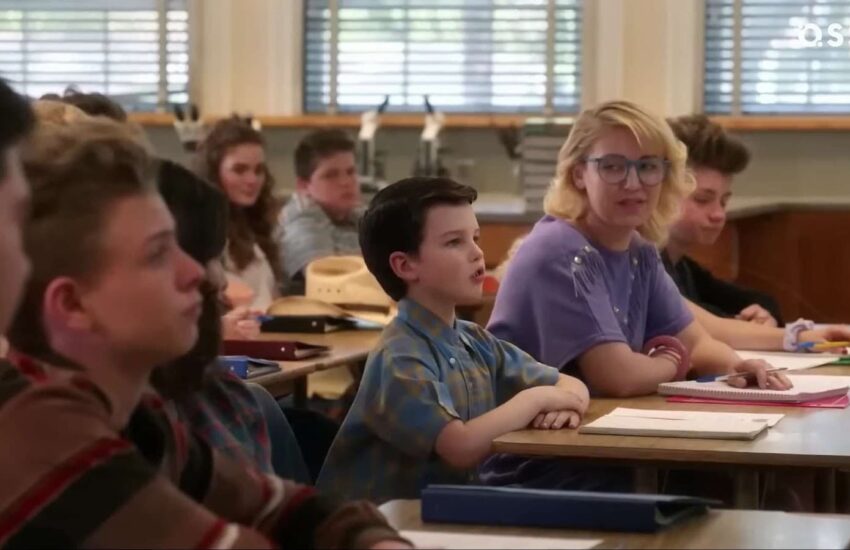
Exploring the Transformation of Livia Soprano through CGI
In the third season of The Sopranos, an intriguing transformation unfolds as we witness the character of Tony Soprano’s mother, Livia, undergoing a significant aging process. This captivating metamorphosis is attributed to the innovative use of CGI, a digital wizardry, necessitated by the unfortunate passing of the actress who masterfully portrayed Livia, Nancy Marchand, back in 2000.
Rather than embarking on the arduous quest for a replacement actress, the astute producers opted for a technological solution. They harnessed the power of CGI to craft a visual illusion, cleverly concealing the void left by Nancy Marchand’s absence and giving the impression that Livia still roamed the Soprano universe. This bold creative decision, however, has left a trail of divergent reactions among the show’s ardent viewers.
For some, Livia’s newfound appearance has proven to be disconcerting, a stark departure from the image etched in their minds from earlier seasons. The uncanny valley effect, where a character straddles the line between realism and artificiality, has left a residue of unease for this faction. On the flip side, a chorus of praise has emerged from those who laud the use of CGI as a means to preserve the character’s continuity within the narrative tapestry.
The rationale behind the decision to age Livia so dramatically remains shrouded in ambiguity. Perhaps, the producers aimed to emphasize the inexorable march of time since her real-life counterpart’s departure from this world. After all, Tony Soprano’s mother met her fictional demise between the second and third seasons, making it conceivable that the producers sought to underscore the profound impact of her death on the Soprano family.
Now, dear viewers, we turn the spotlight onto you. How do you perceive Livia’s remarkable transformation? Does it strike you as peculiar or unsettling? We eagerly await your insights and opinions, so please feel free to share them in the comments below.
Exploring Tony Soprano’s Mother: From CGI Resurrection to Real-Life Tragedy
In the iconic episode “Funhouse Mirror” from the critically acclaimed series, The Sopranos, viewers were treated to a stunning display of cinematic technology. Tony Soprano’s mother, Livia Soprano, was resurrected as a CGI character, captivating fans and sparking curiosity. This bold move was primarily necessitated by the need to portray Livia as a young woman during flashbacks, a task made challenging by the unfortunate passing of the actress who originally brought her to life.
Why CGI for Tony’s Mom?
- Flashback Necessity: The decision to employ CGI stemmed from the demand for flashbacks that featured a youthful Livia Soprano. This called for a creative solution as the original actress was no longer available for these scenes;
- Bridging the Gap: Nancy Marchand, the brilliant actress who portrayed Livia, passed away due to lung cancer, leaving the production team with the challenge of seamlessly integrating her character into the storyline;
- CGI Magic: The skilled use of CGI augmentation and outtakes allowed Livia Soprano to make a poignant return for a single scene, providing closure for both the character and the fans.
The Real-Life Tragedy of Livia Soprano: Unraveling the Mystery
In a narrative twist that mirrored the drama on screen, the character of Livia Soprano was not the only one to meet a tragic end. Behind the scenes, the show’s creator, David Chase, disclosed an intriguing and somber revelation regarding Livia’s demise.
A Mysterious Demise:
- Chase’s Confirmation: In a 2002 TV Guide interview, David Chase revealed a heart-wrenching backstory for Tony’s mother. She had died in a car accident shortly after Tony’s birth, a revelation that added depth and poignancy to the character’s on-screen portrayal;
- The ‘Proshai, Livushka’ Episode: Viewers had long speculated about the circumstances of Livia’s death, with some even suggesting that it occurred on-screen. However, it was in the Season 3 episode “Proshai, Livushka” that Tony’s visit to his mother’s grave confirmed her tragic fate. His tears and deep sorrow were a testament to the enduring pain caused by her untimely passing;
- A Character’s Journey: As Tony’s mother was abruptly written out of the show due to her actress’s passing, it becomes evident that her character’s fate mirrored that of the actress in an eerie parallel. This raises intriguing questions about the show’s creative decisions and the dedication to authenticity.
Livia Soprano’s Complex Character Profile
Livia Soprano, Tony Soprano’s mother, is a multifaceted character in HBO’s series “The Sopranos.” Her psychological landscape is a central focus throughout the earlier seasons.
- Diagnosis: Dr. Melfi, who treats Tony, recognizes symptoms in Livia consistent with borderline personality disorder. There are also elements of antisocial behavior;
- Moments of Compassion: Livia had moments where she showed genuine concern, such as her generous financial support for her granddaughter Meadow during her academic journey.
Dementia:
- Livia’s cognitive struggles were evident when she was absent in the third season due to dementia;
- Signs of her cognitive impairment appeared even before her stroke, as hinted in the series’ pilot;
- Livia’s dementia-related actions led to severe consequences, such as a house fire and a car mishap;
- Her declining mental health becomes more evident as the first season concludes;
- Story Arc & The Actress: Nancy Marchand, the actress portraying Livia, unfortunately passed away, leading to alterations in Livia’s storyline;
- Livia’s usage of her stroke to manipulate emotions and gain control was highlighted in early Season 2;
- The narrative doesn’t delve deeply into Livia’s cognitive decline, though it was frequently alluded to;
- Livia’s assertive and controlling nature led to her eventual end in the series finale.
A looming question remains: What trajectory would Livia’s character have taken if Marchand had lived? It’s suggested that Junior Soprano, Tony’s uncle, might have played a significant part.
Antisocial Personality Disorder: A Deep Dive
Antisocial personality disorder (ASPD) is a severe mental condition characterized by a consistent disregard for the rights of others.
Definitions:
- Conduct Disorder: Recognized in the DSM IV as a strong and recurring pattern of behavior that might involve violence, lawlessness, or other destructive actions;
- Antisocial Personality Disorder: A severe form of social and interpersonal dysfunction;
- Narcissistic Personality Disorder: Another distinct disorder, characterized by a pervasive pattern of grandiosity, a need for admiration, and a lack of empathy.
Tony Soprano & ASPD:
- Tony Soprano is seen as a classic case of ASPD, displaying a range of symptoms like deception, impulsivity, and aggression;
- His criminal activities, which began during his adolescent years, include robberies, assaults, and burglaries;
- Other characters with possible ASPD include Richie and Ralphie, whose violent ends were at the hands of their loved ones – Janice and Tony respectively;
- Bobby’s end was orchestrated by Phil Leotardo’s assassins, another event in the tragic web of violent outcomes.
Dangers of Untreated ASPD:
- In many instances, those with untreated ASPD end up facing violent outcomes, either at their own hands or those of others;
- There is a strong possibility that early and effective intervention could prevent such outcomes;
- The tragedies involving individuals with ASPD can be attributed to the disorder’s untreated state.
Seeking Assistance:
- ASPD is a severe condition that requires professional intervention;
- For those who suspect they or someone they know might have ASPD, it’s imperative to seek professional help;
- Numerous resources exist to provide support and assistance at all stages of the journey towards healing and understanding.
Tony Hawk’s Mother’s Passing: A Grief Shared by the Skateboarding Community
The global skateboarding community was recently gripped by a profound sense of sadness and shock when Tony Hawk, one of the sport’s most iconic figures, took to social media to announce the passing of his mother, Nancy, at the age of 94. What makes this news particularly remarkable is that Nancy lived past the age of 100, despite battling Alzheimer’s disease, a relentless and often devastating form of dementia. In this article, we’ll delve into the significance of Tony Hawk’s experience and explore key insights about Alzheimer’s disease, its impact on individuals and families, and the importance of seeking professional help when needed.
The Resilience of Tony Hawk’s Mother in the Face of Alzheimer’s Disease
Nancy Hawk’s journey through Alzheimer’s disease showcased her remarkable resilience. This neurological condition, known for its progressive nature, wreaks havoc on memory, cognitive abilities, language, and navigation skills. Despite these formidable challenges, Nancy defied the odds by not only living into her 90s but also crossing the centenarian milestone. Her story serves as a testament to the strength of the human spirit and the importance of support from loved ones.

Understanding Alzheimer’s Disease: More Than Memory Loss
Alzheimer’s disease is a multifaceted neurological disorder that extends beyond mere memory loss. It encompasses a range of symptoms and challenges, including:
- Memory Impairment: Alzheimer’s primarily affects short-term memory, making it difficult for individuals to remember recent events or conversations;
- Cognitive Decline: As the disease progresses, cognitive functions decline, impacting problem-solving, decision-making, and reasoning abilities;
- Communication Hurdles: Language difficulties emerge as Alzheimer’s takes hold, leading to frustration and isolation for both the affected individual and their loved ones;
- Spatial Awareness Issues: Navigational skills deteriorate, increasing the risk of getting lost even in familiar surroundings.
Tony Hawk’s Heartfelt Tribute to His Mother
In the wake of his mother’s passing, Tony Hawk expressed his profound grief and love through a heartfelt tweet. The loss of a parent, especially one who has been a source of inspiration, can be an emotionally shattering experience. Tony’s tribute to his mother resonated with many, as it openly conveyed the depths of his sorrow.
The Impact of Nancy Hawk’s Passing on Tony Hawk
Nancy’s passing not only affected Tony on a personal level but also left an indelible mark on his public persona. His character, Ziva, in “Shell Shock,” episode six of Season 10, poignantly reflected on his mother’s departure, remarking that she had “gone to a better place.” This scene provided a glimpse into the emotional journey Tony Hawk has traversed, further endearing him to fans who admire his resilience, not just on a skateboard but in the face of life’s trials.
A Call to Action: Alzheimer’s Disease and Seeking Help
Tony Hawk’s story serves as a poignant reminder that Alzheimer’s disease is a formidable adversary, capable of swiftly diminishing the quality of life for those affected. If you or someone you know is grappling with Alzheimer’s disease, here are some valuable steps to consider:
- Consult a Medical Professional: Seek guidance from a doctor or mental health professional who specializes in Alzheimer’s disease to explore treatment options and support;
- Embrace a Support Network: Building a strong support network of family and friends can provide emotional sustenance during the challenging journey of Alzheimer’s;
- Educate Yourself: Understanding the disease, its stages, and potential interventions empowers individuals and families to make informed decisions;
- Advocate for Awareness: Joining Alzheimer’s advocacy groups and participating in awareness campaigns can contribute to increased research funding and support for those affected.
The Evolution of “The Sopranos” in Season 3
1. Shifting Family Dynamics:
In the third season of “The Sopranos”, viewers witnessed significant changes in the dynamics of the central family. The season primarily focused on the culmination of the tense relationship between Tony and his mother, Livia. The power dynamics saw a pivotal shift with the death of Livia and the subsequent decline of Uncle Junior. Instead of presenting an ongoing feud between Tony and his mother, the storyline emphasized the resolution and closure of this prolonged tension.
2. Enhanced Storytelling Approach:
Season 3 of “The Sopranos” showcased a more refined approach in terms of plot development and execution. It delved deep into darker territories, providing a raw and unfiltered view of the crime world. In one chilling episode, the narrative detailed the horrific ordeal of an innocent woman who was subjected to rape, assault, and ultimately murder. Moreover, in the episode titled “University”, the volatile character Ralph Cifaretto faced accusations of brutally killing his stripper girlfriend just outside the infamous Bada Bing club.
3. Notable Character Arcs:
A memorable subplot involved Bobby Baccala Sr., who had previously stepped back from the criminal underworld. However, he was pulled out of retirement for a mission to deal with a problematic individual named Mustang Sally. This episode, “Another Toothpick”, was a testament to the intricate character developments and the complex moral choices they often faced.
4. Public Reception and Criticism:
Such gritty and intense storylines garnered a mix of reactions. While the show maintained a strong fanbase who appreciated the deeper explorations into the characters’ psyches and the darker sides of crime, it also faced criticism. Many viewers, influential critics, and even some political figures expressed concerns and dissatisfaction over the graphic nature and the controversial themes portrayed. The season became a focal point of discussions on the portrayal of violence and morality in television.
Conclusion
In conclusion, the utilization of CGI technology in recreating Livia Soprano for the world of television and entertainment represents a remarkable convergence of art and technology. The resurrection of this iconic character not only pays homage to the legacy of “The Sopranos” but also showcases the incredible strides that have been made in the field of visual effects and digital storytelling.






